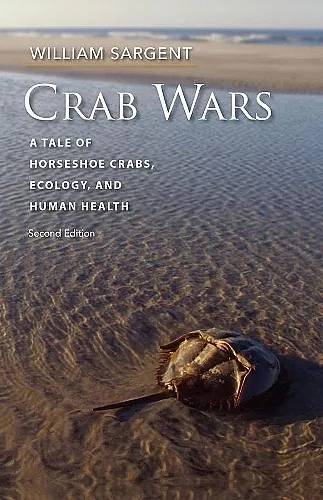Crab Wars - A Tale of Horseshoe Crabs, Ecology, and Human Health
Format:Paperback
Publisher:Brandeis University Press
Published:1st Sep '21
Should be back in stock very soon

Because every drug certified by the FDA must be tested using the horseshoe crab derivative known as Limulus lysate, a multimillion-dollar industry has emerged involving the license to bleed horseshoe crabs and the rights to their breeding grounds. William Sargent presents a thoroughly accessible insider’s guide to the discovery of the lysate test, the exploitation of the horseshoe crab at the hands of multinational pharmaceutical conglomerates, local fishing interests, and the legal and governmental wrangling over the creatures’ ultimate fate. In the end, the story of the horseshoe crab is a sobering reflection on the unintended consequences of scientific progress and the danger of self-regulated industries controlling a limited natural resource. This new edition brings the story up to date as companies race to manufacture alternatives to the horseshoe crab blood, which is now essential for testing vaccines such as those developed to counter COVID-19. However, horseshoe crab populations are still dwindling, with profound implications not only for the future of the crabs themselves but also for the ecosystems that depend on them.
"A popular interest book about how a 300 million year old organism became essential to the modern pharmaceutical industry. Sargent traces the discovery of horseshoe crab blood as the perfect in-vitro test for gram-negative bacteria through the development of a multi-million dollar business. He recounts the battles between multinational pharmaceutical companies to "bleed" enough crabs for Limulus lysate and the demand for crabs by the bait fishery. Regulation of the fishery by individual states complicates the issue of preserving this natural resource."-- "Northeastern Naturalist" "Makes for fascinating reading . . . Crab Wars offers a compact introduction to the horseshoe crab and the controversy it has recently engendered."-- "Journal of the History of Biology" "Here's a species older than time, a species key to the great migrations transecting our planet--and in the space of a few years our short-term interests have brought it close to ruin. It's a powerful metaphor (one wishes it were only a metaphor) and its tale is told with enormous care and balance. And with just the faintest hint of optimism at the end."--Bill McKibben, author of The End of Nature
ISBN: 9781684580767
Dimensions: unknown
Weight: unknown
136 pages